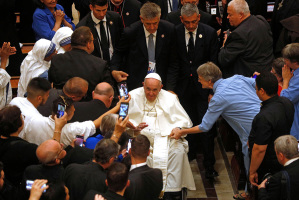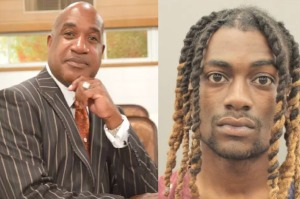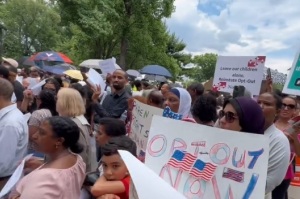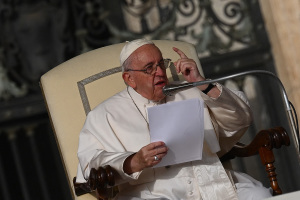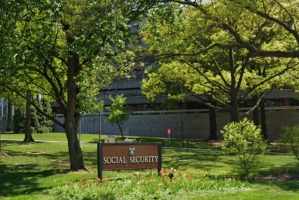Trump admin gives $4M to groups aiding victims of ISIS genocide
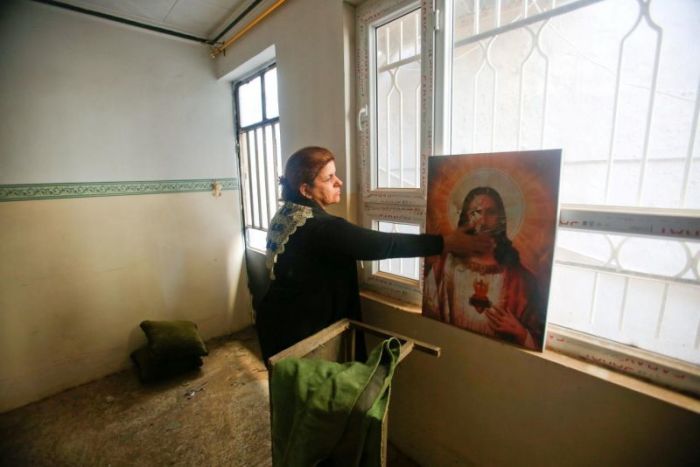
The U.S. Agency for International Development is awarding $4 million to local organizations to help religious minorities recover from the Islamic State’s genocide in northern Iraq. Franklin Graham’s Samaritan’s Purse has also been awarded $9 million to help with return and recovery efforts.
USAID Administrator Mark Green announced the first wave of funding for partner organizations selected as part of the agency’s New Partnerships Initiative while speaking at an event in North Carolina, hosted by an association of Christian humanitarian groups called the Accord Network.
Six organizations were selected as part of the first wave of NPI recipients. Grant recipients will be responsible for carrying out programs that improve the global health outcomes and assist the population in Iraq trying to recover and rebuild their communities destroyed by IS.
“This is an initiative that I think in so many ways is really led by Vice President [Mike] Pence and in his great interest,” Green said during the event on Wednesday. “When you look at places like Northern Iraq as my friend and former colleague Frank Wolf constantly reminds me, take a look at the Bible. Other than the obvious in the Holy Land, there are very few places where you'll see more biblical references than in Northern Iraq.”
“If we're going to help restore what is sometimes called the mosaic of faiths and ethnicities in Northern Iraq, I believe that we have a role."
The announcement comes as hundreds of thousands of people remain in displacement camps in northern Iraq even after the Islamic State was militarily defeated in the Ninevah Plains. The U.N. estimates that there are about 500,000 returnees targeted for assistance in Iraq.
The NPI program was launched in May 2019 as a way to “expand and diversify” USAID’s partner base in Iraq and also alter the way USAID works in the region. The initiative enables the State Department entity to work with new or underutilized partners and to tap into existing networks of faith-based and community organizations.
Among the first wave of recipients is the Philadelphia Organization for Relief and Development, which is working to establish a community center in the predominantly Christian town of Qaraqosh.
The community center will provide services for people with disabilities, train people in employment skills, provide childcare and serve as a community food bank.
The Catholic University of Erbil is another recipient. The university is providing classes in business language and computer software for former Islamic State captives, victims and widows.
The Shlama Foundation, which works to help the Chaldean, Assyrian and Syriac communities, was given an award to help improve job opportunities for Iraqi youth. It will provide business training, build commercial networks and promote entrepreneurship.
The Jiyan Foundation for Human Rights was given an award to provide trauma rehabilitation and resilience services to survivors of the Islamic State genocide. The foundation will also provide legal services and programs to promote interreligious and interethnic dialogue.
Another award will help re-establish a women-led organization that was destroyed by the Islamic State. The organization provides small-business vocational training to women across the Nineveh Plains.
An organization serving as a business incubator and an employment training program for Iraqi youth is also an award recipient.
According to USAID, the new awards bring the total assistance provided by the U.S. government for northern Iraq to over $400 million.
Programs like NPI serve as a complement to the Iraq and Syria Genocide Relief and Accountability Act passed by Congress last November.
The bill was designed to “provide emergency relief to victims of genocide, crimes against humanity and war crimes in Iraq and Syria” and “provide accountability for perpetrators of these crimes.”
In addition to announcing the first wave of NPI grant recipients, Green also announced an $18 million award to the International Organization for Migration to support the return and recovery of displaced religious minorities across the Nineveh Plains.
Of that $18 million, evangelical humanitarian agency Samaritan’s Purse (headed by conservative evangelical leader Graham) will receive $9 million.
Green also announced two new awards under USAID’s NPI for global health to create quality access and sustainability of health care in northern Iraq. The two awards total $68 million.
One of the two recipients for the awards for global health is World Relief, the humanitarian arm of the National Association of Evangelicals.
World Relief will be tasked with expanding and leveraging its existing networks across four countries to strengthen “maternal, reproductive, and child health at the local level.”
Meanwhile, Palladium International will help USAID to reach its goal of increasing “access to, high-quality health care across priority areas.” Palladium International will provide 65 percent of its award to local organizations contracted as sub-awardees.
In September, USAID awarded $6.8 million to Catholic Relief Services, which works in partnership with the Chaldean Catholic Archdiocese of Erbil to help to resettle families with their household needs.
Follow Samuel Smith on Twitter: @IamSamSmith
or Facebook: SamuelSmithCP
















